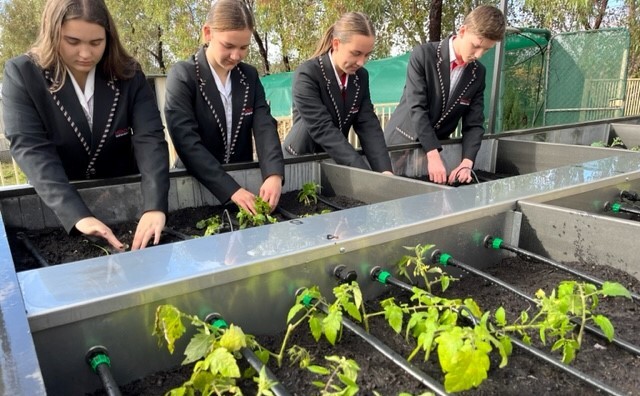21.08.2023
iFarm blazes trail in STEM learning
Tatachilla has become one of only seven schools in the state to boast a revolutionary iFarm.
What is an iFarm?
The iFarm – pioneered by inventors Steve and Kate Mansur – is a fully computerised, outdoor farm research station that features eight automated garden beds that allow students to compare the impact of different soil types, irrigation levels, fertilisers and micro-climates on crop growth.
The iFarm program is funded by the Australian Government Department of Agriculture, Fisheries and Forestry as part of the national Educating Kids About Agriculture initiative. More than 50 iFarms are currently being rolled out to high schools across the country through a competitive bid process as part of a national effort to bring agricultural innovation to secondary education.
Each iFarm package represents an investment of more than $90,000, including installation, research and development, cloud technology, maintenance and ongoing support.
What can the iFarm do?
The iFarm is a game-changer in the teaching of agricultural science and STEM subjects. It enables students to undertake simultaneous crop trials, record live data using the iFarm’s in-built computer, view root growth through the iFarm’s clear Perspex sides and upload and compare data with other schools that are also using iFarm technology.
In addition to the automated garden beds, all iFarms feature their own weather station as well as subsurface drip irrigation; overhead spray options; a 2,000L water tank; moisture and temperature sensors; an inbuilt digital touchscreen; a worm farm for composting; and summer and winter shade-cloths.
The iFarm is powered through wind and solar energy and can be operated remotely or in-person. Even the electronic componentry has a clear Perspex cover so that students can view and better understand electrical design and function.
Why is the iFarm important?
According to Tatachilla’s agricultural science expert, Isabelle Linde, there has never been a better time to study agricultural science and the iFarm will be a critical factor in elevating hands-on, interactive learning at the college and igniting careers in the STEM fields.
“We know that agricultural science is a burgeoning sector globally, and one that has seen an exponential increase in technological advancement, career diversity and international focus over the past 20 years,” says Ms Linde, who campaigned strongly for the college to be one of the few schools chosen for the national iFarm program.
“Students who pursue a career in agriculture now have the opportunity to combine their skills in science, technology, engineering, mathematics and business to address some of the world’s biggest challenges.
“These challenges include food security, bioweaponry, large-scale pest outbreaks, extreme weather conditions, land scarcity and the decline of the international bee population, to name a few.
“The iFarm represents an exciting new way for Tatachilla students to experience firsthand how climate variables impact crop propagation and to understand the skills and technology required to produce food and fibre sustainably and in the context of changing world.”
Tatachilla students have already utilised their iFarm to examine the impact of different soil compositions and irrigation regimes on the yield and quality of vegetable crops, and to compare the growth and health of herbs and fruit grown in both controlled and uncontrolled environments.
The college is currently forging ahead with its own groundbreaking agricultural science pathway for students in response to significant global investment in the food, agribusiness and agtech sectors and the corresponding employment demand that this investment is generating.
“Our students currently have the option of studying agricultural science as one of their core sciences in Year 9 and 10 and by 2025, they will be able to continue their agricultural science studies at the Year 11 and 12 levels,” Ms Linde says.
“Unlike other South Australian schools who offer agricultural science, Tatachilla will focus on emerging agricultural innovations and technologies, as opposed to current agricultural processes and local farming practices.”
“Naturally our iFarm will play a significant role in our agricultural science curriculum and amplify the application of STEM knowledge to emerging agricultural industries.”
Inspiration behind the iFarm
Steve and Kate Mansur came up with the idea for the iFarm as a way of stimulating interest in the swathe of agricultural career options now available to emerging scientists and the technologies that are being innovated to support them, including bee vectoring, vertical farming, automated harvesting, drone-based disease management and even laser scarecrows.
The aim of the iFarm was also to help students learn about STEM disciplines in a much more engaging and impactful way and assist teachers in bringing theoretical concepts to life, right before students’ eyes.
“Our iFarm is fully designed, developed and manufactured in Australia and we could not be prouder of the finished product,” says Steve Mansur, who is one half of the iFarm Australia team, alongside his wife Kate.
“It has given us great joy and satisfaction to gift our iFarm technology to those schools who have been chosen for the inaugural rollout of the iFarm program and help install each iFarm personally.”
What other South Australian schools have an iFarm?
Other schools in South Australia that currently have an iFarm include Grant High School (Mount Gambier); Tintinara Area School (Tintinara); Karoonda Area School, (Karoonda); Renmark High School (Renmark); Mount Barker High School (Mount Barker); and Oakbank School (Oakbank).
More information




